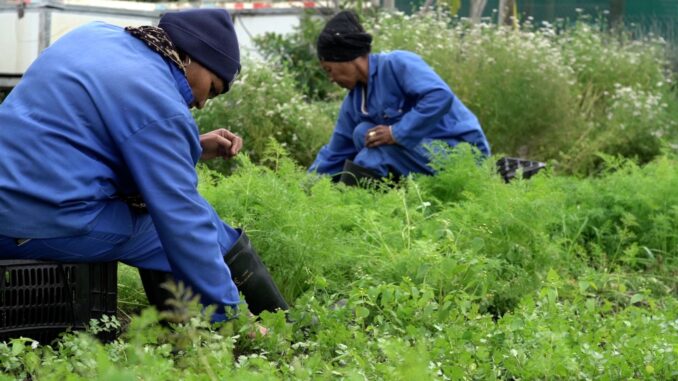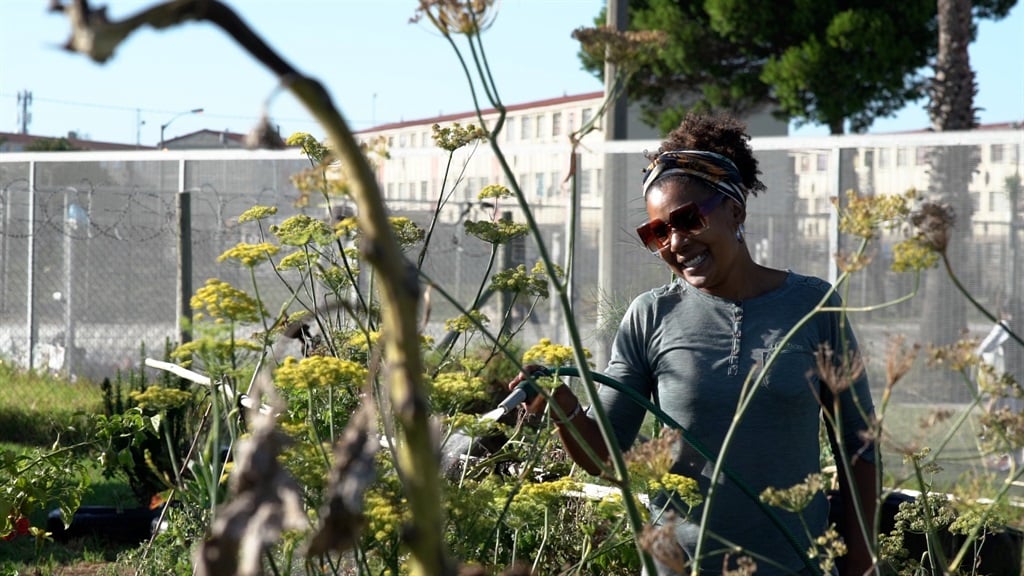
- An unemployed single mother started a backyard garden in Hanover Park to put food on the table.
- It’s now grown into a community food garden that helps troubled kids and teaches residents how to produce their vegetables with limited space.
- The garden at Mount View High School has also brought into sharp focus the issue of food security, especially in the wake of the Covid-19 pandemic.
A burgeoning vegetable garden in Hanover Park has become a refuge for at-risk youth and a training ground for budding green thumbs in the Cape Flats.
Unemployment and the ever-present fear of being unable to afford food are common concerns that haunt households in the Cape Flats. These exact conditions led a single mother to start a vegetable garden in the small backyard of her Hanover Park home almost a decade ago.
“I was unemployed [and] struggling to put food on the table,” says Renshia Manuel, a single mother of four who’s lived in Hanover Park for the past 14 years.
“I think it was the shame of not being able to feed my family [that led her to start the garden]. I didn’t want to go out and borrow.”
Manuel, who spent school holidays in the farming communities near Robertson and Piketberg, started her backyard garden out of “pure desperation”.
This humble vegetable garden, which kept Manuel and her family fed, soon caught the attention of her neighbours, who were inspired to grow their food but lacked the space to do so. This activated her entrepreneurial spirit.
She initially planned to start a nursery but changed tack and shifted to a range of handmade wooden planter boxes. Soon after, GrowBox was born.
Rooted in the community
The search for a piece of arable land in Hanover Park was answered by Mount View High School, with the principal seeing the potential value of pupils spending time in the food garden. Since 2018, the GrowBox garden at Mount View High School has expanded to include greenhouses, grow tents, rows of seasonal vegetable crops, and an outdoor showroom of urban food gardening solutions such as planting in used car tires.
The garden has been incorporated into the school’s teaching, with pupils learning about sustainable farming and ecosystems. It’s also become a lifeline for pupils with discipline issues.

“There are learners who have issues. Sometimes it’s discipline issues; sometimes it’s social issues. The social workers or teachers will engage with us to have those learners here for a few sessions,” explains Manuel.
“They get to interact and be active with the programmes we have here. So, either they’ll be planting or clearing or transplanting in the urban farm.”
Time spent in the garden, away from challenging home environments and off the streets, has a calming effect on these pupils, says Manuel.
Growing your food
While giving Hanover Park youth a positive outlet has the potential to steer them away from gangsterism and crime, GrowBox also leads community workshops where participants interested in starting their food gardens are taught about soil nutrition, seed catching, and composting.
Manuel said:
We take them on a food growing pathway [and] if there’s a participant that doesn’t have a gardening space at home but they’re eager to garden then we’ll give them an allotment space on our urban farm, where they get their own space to grow their food.
GrowBox has also participated in the Ithemba Phakama 4Ps project, led by the Department of Forestry, Fisheries and the Environment, and NCC Environmental Services, in employing Hanover Park residents looking for work. Several participants were selected to work at GrowBox and received a stipend through the programme.
The issue of food security was accelerated during the COVID-19 pandemic when many households were left without any source of income. Community food gardening initiatives like GrowBox gained popularity during this time.
“Growing your own food is essential. The social grant went up by R30 [and] that R30 is not enough … it’s maybe a loaf-and-a-half of bread extra for a household,” says Manuel.
“Households need an extra food resource and need access to food. The rising food costs are just too much. You can’t keep up with it.”
